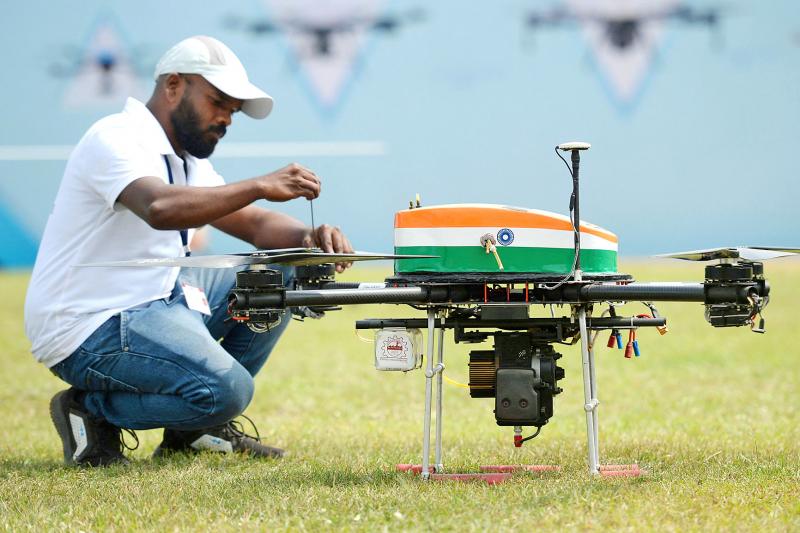India has banned the import of drones, a move that effectively blocks an emerging market for China’s SZ DJI Technology Co (大疆創新), the world’s top drone maker, and encourages a nascent local industry to increase production.
Import of some drone components is to be allowed without approval, the Indian Directorate-General of Foreign Trade said in an order late on Wednesday.
Drones used for research and development, defense and security purposes would be exempt from the ban, the government said.

Photo: AFP
Amid the continuing disputes between China and US, drones have taken center stage as concerns surface that Shenzhen, China-based DJI might be relaying some sensitive data to Chinese intelligence agencies on everything from critical infrastructure, such as bridges and dams, to personal information, such as heart rates and facial recognition.
India last year relaxed rules on the use of drones to make it easier to acquire licenses and allowed heavier payloads, so the devices can potentially be used as uncrewed flying taxis.
India is to offer 1.2 billion rupees (US$16 million) of incentives for drone makers under Indian Prime Minister Narendra Modi’s US$20 billion plan to lure the world’s biggest brands to make their products in India and export them to the world.
Rattanindia Enterprises Ltd, a local drone maker, said that India’s move would help to make the nation a drone manufacturing hub.
The new rules would allow better efficiency in supply-chain operations, inventory and fund management, the company said in a statement yesterday.
The pandemic has intensified a shift to automated delivery for meals, groceries, medical supplies and other essentials, boosting the drone industry.
Autonomous-vehicle firms, delivery start-ups and drone operators have touted the benefits of contactless systems.

KEEPING UP: The acquisition of a cleanroom in Taiwan would enable Micron to increase production in a market where demand continues to outpace supply, a Micron official said Micron Technology Inc has signed a letter of intent to buy a fabrication site in Taiwan from Powerchip Semiconductor Manufacturing Corp (力積電) for US$1.8 billion to expand its production of memory chips. Micron would take control of the P5 site in Miaoli County’s Tongluo Township (銅鑼) and plans to ramp up DRAM production in phases after the transaction closes in the second quarter, the company said in a statement on Saturday. The acquisition includes an existing 12 inch fab cleanroom of 27,871m2 and would further position Micron to address growing global demand for memory solutions, the company said. Micron expects the transaction to

Nvidia Corp’s GB300 platform is expected to account for 70 to 80 percent of global artificial intelligence (AI) server rack shipments this year, while adoption of its next-generation Vera Rubin 200 platform is to gradually gain momentum after the third quarter of the year, TrendForce Corp (集邦科技) said. Servers based on Nvidia’s GB300 chips entered mass production last quarter and they are expected to become the mainstay models for Taiwanese server manufacturers this year, Trendforce analyst Frank Kung (龔明德) said in an interview. This year is expected to be a breakout year for AI servers based on a variety of chips, as

Global semiconductor stocks advanced yesterday, as comments by Nvidia Corp chief executive officer Jensen Huang (黃仁勳) at Davos, Switzerland, helped reinforce investor enthusiasm for artificial intelligence (AI). Samsung Electronics Co gained as much as 5 percent to an all-time high, helping drive South Korea’s benchmark KOSPI above 5,000 for the first time. That came after the Philadelphia Semiconductor Index rose more than 3 percent to a fresh record on Wednesday, with a boost from Nvidia. The gains came amid broad risk-on trade after US President Donald Trump withdrew his threat of tariffs on some European nations over backing for Greenland. Huang further

HSBC Bank Taiwan Ltd (匯豐台灣商銀) and the Taiwan High Prosecutors Office recently signed a memorandum of understanding (MOU) to enhance cooperation on the suspicious transaction analysis mechanism. This landmark agreement makes HSBC the first foreign bank in Taiwan to establish such a partnership with the High Prosecutors Office, underscoring its commitment to active anti-fraud initiatives, financial inclusion, and the “Treating Customers Fairly” principle. Through this deep public-private collaboration, both parties aim to co-create a secure financial ecosystem via early warning detection and precise fraud prevention technologies. At the signing ceremony, HSBC Taiwan CEO and head of banking Adam Chen (陳志堅)